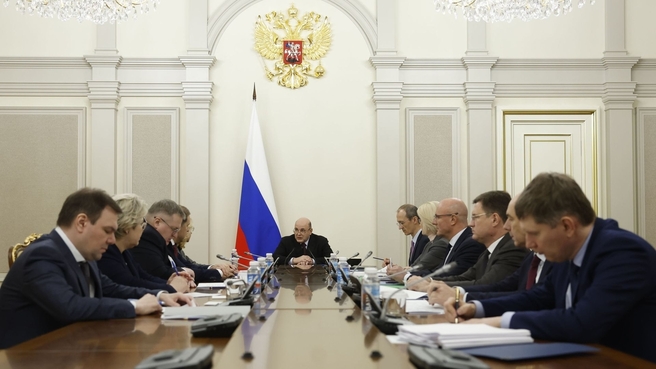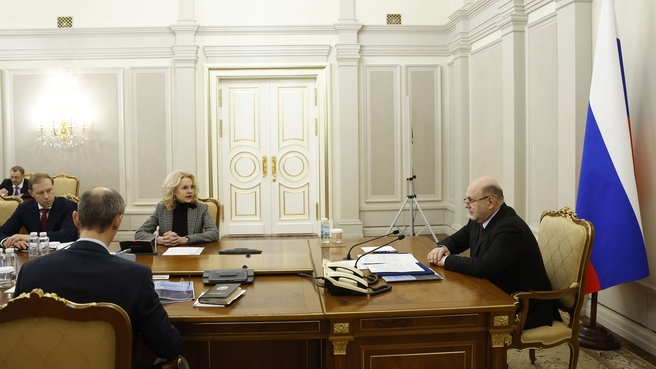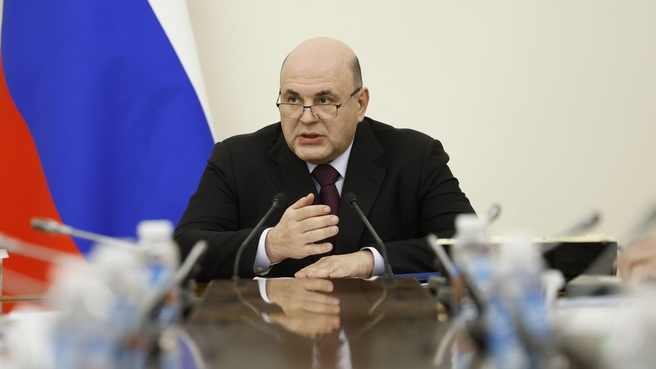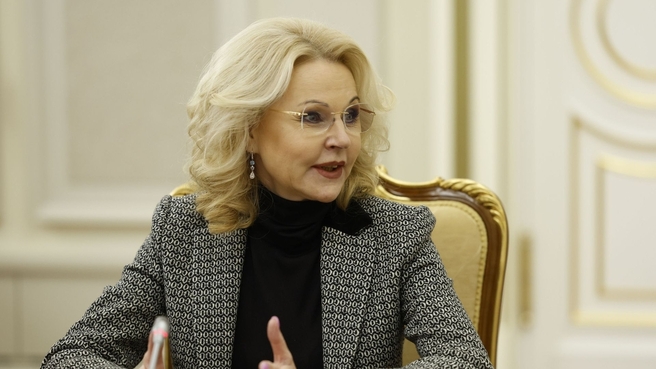Agenda: Plans for the Year of the Family, programme to guarantee free healthcare at the national level for a three-year period, supporting the agribusiness sector, and carrying out the Major Clean-Up Effort federal project.
Mikhail Mishustin’s opening remarks
Report by Tatyana Golikova on plans for holding the Year of the Family in Russia in 2024
Progress Report by Viktoria Abramchenko on the Major Clean-Up Effort federal project
Meeting with deputy prime ministers on current issues
Excerpts from the transcript
Mikhail Mishustin: Good afternoon, colleagues.
As you know, the President designated 2024 as the Year of the Family, and the Government has approved a plan setting forth the main events that will be part of this initiative, as instructed by the President.
The Government has always prioritised supporting people who are bringing up children, helping parents and taking care of the younger generation.
We have also provided for the drafting of a strategic document dealing with demographics and family policy until 2030.
At the federal level, we have plans to enact a single legal status and offer uniform social guarantees for families with three children or more. In addition, the President has instructed us to extend family benefits so that those having a third child will qualify, and we carried out these instructions. Families can put this money towards paying off their mortgages.
We will pay special attention to healthcare, including for future parents.
Ms Golikova (speaking to Tatyana Golikova), you chair the organising committee in charge of the Year of the Family. May I ask you to report on the upcoming events?
Tatyana Golikova: Mr Prime Minister, our common goal and one of our priorities is to restore respect for the concept of a large family and strengthen family values. The latest poll by the National Public Opinion Research Centre shows that seven out of ten respondents see a strong family as the most important value. This is regardless of education, age or financial standing.
Young people aged 18 to 24 are particularly important to us because they will start having children in the next seven years. Their attitude towards family values and parenthood are certainly important to us because these imply a new social status and a new responsibility with respect to the new generation being born.
As you have already said, as per the President’s instruction and your directive, we set up the Year of Family Organising Committee. During its first meeting held in late December, we discussed and approved a plan of major events that has been finalised by now. When creating this events programme, we primarily focused on addressing demographic tasks at hand. These include creating conditions for new families to have their first children; improving reproductive health; supporting large and multi-generation families; and, if you will, starting a healthy trend of having a large family.
Of course, the Year of Family will be a truly large-scale event if all the regions get involved. We expect that by 1 February 2024, all regions will approve their regional action plans based on the federal plan.
I would like to briefly mention the key tracks of events we plan to hold.
The first track includes the most significant nationwide events. These are honouring parents who received the Mother Heroine award, the Parent Glory medal and order; national family contests such as Runs in the Family and Family of the Year, as well as celebrations marking the Day of Family, Love and Faithfulness, and other events. The first class on Knowledge Day and graduation events will be also dedicated to the Year of Family.
The Year of Family will open with the Loved Ones national family forum, held during the Russia Expo at VDNKh starting 19 January.
The second track of events includes measures to improve the status of families with children. You have mentioned some of these measures, but I would like to add that, according to the President's instruction, we are to draft a strategy under the Demographic and Family Policy until 2030. This document will replace the State Family Policy until 2025 and the Demographic Policy until 2025. We believe it is necessary to hold an extensive public discussion of this strategic document in 2024 in view of the country’s current demographic challenges, before we approve it.
Another essential task for this year is to work on additional measures concerning concessionary mortgages. As you have already said, in the first quarter we are to extend the 450,000 roubles in mortgage support benefits for families with three and more children, as instructed by the President.
In addition to this, the President instructed us to create a single federal status for families with three children or more.
We are also focusing on other priority objectives, such as getting corporations and employers involved in the family agenda. They have a major role to play when it comes to supporting working parents, young families, and families who want to have children. We will work with employers and trade unions to review the best practices and facilitate their adoption by the corporate sector, as well as at the regional level.
Mass cultural, sports and social events are another important track. They bring families together and have a team-building function, while also enabling families to demonstrate their talents.
In fact, this track will be one of the items on the agenda of a forum which is about to open as part of the Russia Expo.
Two tracks concern working with parents, including those planning their first child. This effort to promote responsible parenting and educational initiatives is extremely important.
Of course, there will be an outreach and communication effort throughout the Year of the Family. It is essential for us that the feedback we receive is positive.
Mr Mishustin, colleagues, we tried to factor in all the events as instructed by the President, as well as in keeping with your instructions, into this plan.
Moreover, we have also received proposals from federal executive bodies and experts. But since we do not have much time, we agreed to approve this plan and to adjust it as needed as we move along. I invite all my colleagues to proactively contribute to our initiatives as part of the Year of the Family.
Mikhail Mishustin: Thank you very much, Ms Golikova.
Obviously, family is the highest value in our country. It is very important to do everything we can for a higher birth rate and the most support and assistance to parents. We are consistently working on this under the President’s instructions. Much has been done, in part, through the social treasury system under which targeted social assistance is rendered to all families. Please, keep this plan under your personal control.
Now a few words about another decision. The Government has approved a programme of state guarantees for free medical assistance for the next three years. Funding for this through the compulsory medical insurance system has been increased by over 400 billion roubles for this year. This makes it possible to improve the quality and accessibility of treatment. It will continue to be granted free of charge under the policy of mandatory medical insurance.
Now I have a number of other changes to discuss.
The President emphasised the importance of disease prevention. The rules for conducting medical examinations have been clearly outlined. The periods for in-depth medical examinations for COVID patients have been extended. Now they will be able to a medical check-up within a year after recovery. Referrals for additional examinations must be issued within three days.
As I said, the President has declared 2024 the Year of the Family. This is why the programme must be supplemented with a new medical exam on reproductive health, which is vital for people who want to have children.
We also specified the procedures for the field teams that take part in organising medical examinations for people in remote areas. They will be notified in advance about the arrival of these specialists so that those who wish to do so can check their health and receive qualified recommendations and consultations from doctors.
Several types of high-tech procedures have been transferred to the compulsory medical insurance schedule to make them more accessible. This applies to ophthalmology, urology, traumatology/orthopedics as well as chronic heart failure and vascular diseases. Previously, the federal budget covered expenses on these complicated surgeries and procedures, and now the Federal Compulsory Medical Insurance Fund will pay for them. The money thus saved – about 6.5 billion roubles – will be spent to pay for in-demand treatment of other ailments where people are on the waiting list.
The Government continues paying special attention to healthcare issues to make sure people are able to receive assistance free of charge throughout the country, regardless of their place of residence. The necessary resources have been provided.
The next issue is about support for the agro-industrial sector. The President noted that the Russian agro-industrial sector has achieved much growth and is strengthening its position in most areas. It is very important to preserve this dynamic and the confidence of our agrarians in steady work and sustainable cooperation ties.
To make this sector more effective, the Government is implementing measures of state assistance. These include subsidies for farms. Last year, we allocated over 6 billion roubles for this purpose under the federal project.
We will provide about 8 billion roubles for the same purpose in 2024. A signed resolution will specify a procedure for allocation. Thus, a minimum amount of 1.5 million roubles has been fixed for the recipients of Agro-startup grants. We also expanded the options for using these funds. For instance, now it is possible to spend it for the purchase of berry seedlings.
Every region will determine its priorities independently to compensate part of expenses sustained by agricultural consumer cooperatives. Purchase of berries from personal households has been added to this list. Agro-industrial equipment will become more affordable in Siberia. Reimbursement for expenses to purchase it has been increased up to 60 percent.
We hope the adopted decisions will make it possible for more people to start their own businesses and provide the country with high-quality food products.
I think it is necessary to discuss one more issue – environmental protection.
As the President noted, environmental issues are very important for the economy and each individual.
The Government has continued working on the Major Clean-Up federal project for more than three years now. This is our strategic initiative. It was drafted by the cabinet of ministers. It is producing good results, in part, in studying, assessing and eliminating hazmat sites that have an adverse impact on the environment. These include landfills, inactive industrial sites and other facilities that produce waste that pollutes water, soil and air. The most dangerous factor is that they are creating risks for the health and safety of people.
Over a thousand of such facilities will have to be assessed before the end of this year. Last year’s amendments to the law require the regions and municipalities to take a more active part in these activities. Incidentally, we have a positive experience of cooperation with the Irkutsk Region in settling the situation in the city of Usolye-Sibirskoye. We have planned a lot of more work to be done there.
One more area in the Major Clean-Up project is the recovery of sunken ships. Last year alone, 88 ships were removed from the Far Eastern Federal District. Importantly, business people are taking part in this project. In other words, the cleaning of the basin continues with the use of public-private partnership mechanisms.
Ms Abramchenko, please tell us about the results of this work and the priorities for the New Year.
Viktoria Abramchenko delivered a report at the meeting with deputy prime ministers
Viktoria Abramchenko: Mr Mishustin, colleagues,
Indeed, the Government's strategic initiative to clean up the country is among the most ambitious and important environmental projects.
We are liquidating abandoned industrial sites, oil wells and other accumulated hazardous waste sites that pose an environmental threat and impact quality of life.
Most importantly, we are creating a system to make sure no such sites are created moving forward.
For example, we have legally mandated that owners fund the decommissioning of their environmentally hazardous enterprises and eliminate accumulated waste.
We have introduced sizable fines — up to 20 million roubles — for deliberately sinking a vessel.
As part of the cleanup on land, we ensured the liquidation of 145 oil wells from the unallocated subsoil reserve fund by the end of last year.
To date, we have completed a survey of 770 accumulated hazmat sites, of which 38 present high risks to human health. We plan to liquidate them first.
We started developing the procedure for liquidating hazardous sites in the new regions.
Design documentation is being drafted to liquidate a chemical waste landfill in the Lugansk People's Republic and a final storage facility operated by the former Gorlovka Chemical Plant in the Donetsk People's Republic.
Work is underway to plan the liquidation of four more sites in the Kherson and Zaporozhye regions.
The Government has allocated 375 million roubles to this end.
Work to liquidate hazmat sites, including under separate instructions issued by the President and the Prime Minister, will continue in the Astrakhan Region and the Krasnodar Territory in 2024.
Mr Mishustin, on your instruction and as part of the cleanup effort, we are raising and disposing of ships in the waters off the Far Eastern Federal District. To date, 131 scuttled ships have been salvaged.
These ship graveyards interfere with navigation, fishing, harm the environment and impact the regions’ tourist potential. This year, we plan to raise 82 more ships.
We have taken a number of additional measures to ensure the success of the federal project.
First, the powers of the federal, regional and municipal authorities have been clarified.
From now on, municipal and regional authorities will be mostly involved in identifying such sites, the Federal Service for Supervision of Natural Resources (Rosprirodnadzor) will conduct surveys, and the Federal Service for the Oversight of Consumer Protection and Welfare (Rospotrebnadzor) will assess the impact of each site on human health.
Second, we have established new rules for identifying and surveying the accumulated harm sites and maintaining the state register of such sites, criteria for priority liquidation, as well as the procedure for verifying the accuracy of the estimated cost of the liquidation sites.
Now, an object will be deemed liquidated after Rosprirodnadzor confirms its liquidation following a lab test.
These measures will help cut budget spending and set priorities based on ensuring safety for humans and the environment.
The national cleanup campaign is on schedule.
A total of 5.2 billion roubles have been allocated for this project over the past two years. This year, the Government will finance the cleanup campaign in the amount of 3.6 billion roubles.
By the end of this year, Rosprirodnadzor and Rospotrebnadzor will have completed a survey of 1,002 hazmat sites and draw up a priority liquidation list based on the impact of such sites on human health and the environment.
Mikhail Mishustin: Thank you, Ms Abramchenko.
Environmental protection is, above all, about quality of life and the safety of our citizens. Considering this, we should prioritise the danger posed by high-risk sites and liquidate them as soon as possible. This is the most important part of our work. The main thing is to keep up the pace. Please, keep a close eye on the situation in the regions.
















